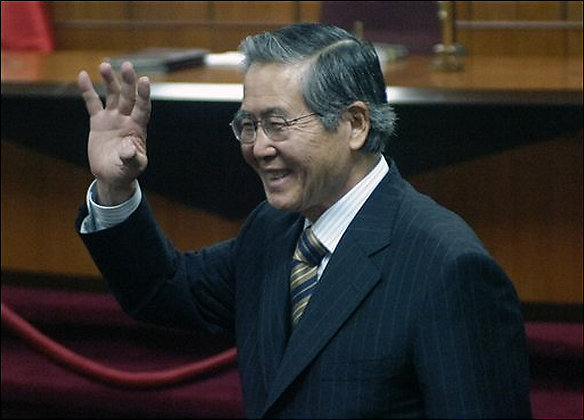Fujimori Gets 6 Years For an Illegal Search While Leader of Peru
Published: Wednesday, December 12, 2007; p A24 - Washington Post
By Monte Reel, Washington Post Foreign Service
LIMA, Peru, Dec. 11 -- Former president Alberto Fujimori was sentenced to six years in prison Tuesday for ordering an illegal search during the final days of his rule, as a judge ruled on the first in a series of prosecutions that may continue for months.
The sentence came a day after Fujimori shouted his innocence at the opening of a separate trial on charges of human rights abuses, which include allegations that he ordered the murders of 25 people by a government death squad in the early 1990s. An expressionless Fujimori told the judge he would appeal part of Tuesday's sentence, which also included a fine of nearly $135,000.
(below) Former Peru's President Alberto Fujimori waves while entering
a courtroom before an audience of his trial at a police base in Lima,
Tuesday, Dec. 11, 2007. (AP Photo/Karel Navarro) Supreme Court Judge Pedro Guillermo Urbina ruled that Fujimori had abused
his power in 2000 when he ordered a military aide to search the apartment
of the wife of Vladimiro Montesinos, Fujimori's former security chief,
who was then embroiled in a money-laundering scandal. Fujimori did not
deny ordering the search but had said it was part of a nationwide manhunt
for Montesinos. Prosecutors argued that he ordered the search in an effort
to seize evidence that might have directly implicated him in Montesinos's
crimes.
Supreme Court Judge Pedro Guillermo Urbina ruled that Fujimori had abused
his power in 2000 when he ordered a military aide to search the apartment
of the wife of Vladimiro Montesinos, Fujimori's former security chief,
who was then embroiled in a money-laundering scandal. Fujimori did not
deny ordering the search but had said it was part of a nationwide manhunt
for Montesinos. Prosecutors argued that he ordered the search in an effort
to seize evidence that might have directly implicated him in Montesinos's
crimes.
Fujimori's daughter told reporters that the sentence was unfair and part of a systematic effort to persecute her father.
"Before, it was political persecution, and now it's judicial persecution," said Keiko Fujimori, who serves in Peru's Congress with a group of legislators loyal to her father.
If Fujimori is eventually convicted of more than one crime, he would serve his sentences concurrently. The maximum sentence he faces is up to 30 years in prison and $33 million in fines.
Fujimori, 69, began his decade-long presidency in 1990 and promptly launched a counterinsurgency campaign against the Shining Path, a Maoist guerrilla group that had killed thousands and terrorized the Peruvian countryside in the course of a violent rebellion.
His detractors say he went too far, ruthlessly targeting anyone his government deemed a leftist. Supporters credit him with pacifying the country and rebuilding an economy that had been a shambles when he assumed office. Though recent opinion polls suggest that most people believe Fujimori is guilty of abuses, a majority also view his presidency favorably overall.
Fujimori fled Peru in 2000 in the face of a corruption scandal and faxed in his resignation from Japan, the birthplace of his parents. He spent five years in exile there, then was arrested in Chile when he attempted to return to Peru in a bid to resurrect his political career.
His trial on charges of human rights abuses is scheduled to resume Wednesday.